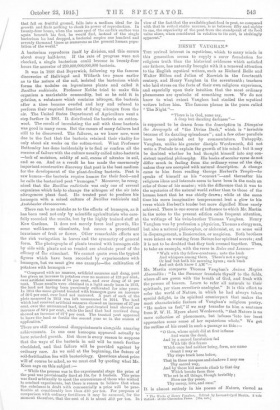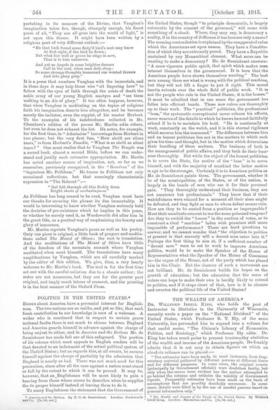HENRY VAUGHAN.* Tins revived interest in mysticism, which to many
minds in this generation seems to supply a surer foundation for religious truth than the historical evidences which satisfied our fathers, has naturally brought with it a renewed attention to the English mystical writers, such as Richard Rolle and Walter Hilton and Julian of Norwich in the fourteenth century, and Henry Vaughan in the seventeenth ; teachera who laid stress on the facts of their own religious experience, and especially upon their intuition that the most ordinary phenomena are symbolic of something more. We do not know to what extent Vaughan had studied the mystical writers before him. The famous phrase in the poem called " The Night "— "There is in God, some say, A deep but dazzling darkness"— is supposed to be drawn from the description in Dionysius the Areopagite of "the Divine Dark," which is "invisible because of its dazzling splendours"; and a few other parallels have been pointed out by commentators. Unhappily, Vaughan, unlike his greater disciple Wordsworth, did not write a Prelude to explain the growth of his mind: but it may be doubted whether he had thought himself into any con- sistent mystical philosophy. His books of secular verse do not differ muoh in feeling from the ordinary verse of the day, unless they are occupied with natural description. A change came to him from reading George Herbert's Temple—he speaks of himself as his " convert "—and thereafter his religious ideas and interests seem to have been in the main an echo of those of his master; with the difference that it was to the mysteries of the natural world rather than to those of the human heart that lie was chiefly drawn; while at the same time his more imaginative temperament lent a glow to his verse which Herbert's tender but more dignified Muse rarely achieved. There is one source of influence to which Mr. Martin in the notes to the present edition calls frequent attention, the writings of his twin-brother Thomas Vaughan. Henry Vaughan was by profession a physician, Thomas a clergyman, but also a natural philosopher, or alchemist, or, as some said in disparagement, a Rosiorucian, or magician. Both brothers were intent on wresting from Nature her spiritual secrets ; and it is not to be doubted that they took counsel together. Thus, to take an example, with the verse in Rules and Lessons— "Walk with thy fellow-creatures ; note the hush And whispers among them. There's not a spring Or leaf but hath his morning hymn; each bush And oak cloth know I Ald"— Mr. Martin compares Thomas Vaughan's Anima itragica Abscondita "In the Summer translate thyself to the fields, where all are green with the breath of God, and fresh with the powers of heaven. Learn to refer all naturals to their spirituals, per viam secretioris analogiae." It is this effort to refer the world of Nature, in which he had always taken to its spiritual counterpart that makes the most characteristic delight, feature of Vaughan's religious poetry. "He makes us feel," if we may transfer to him a sentence from F. W. H. Myers about Wordsworth, " that Nature is no mere collection of phenomena, but infuses 'into her least approaches some sense of her mysterious whole." We get the outline of his creed in such a passage as this :— "0 thou, whose spirit did at first inflame And warm the dead, And by a sacred Incubation fed
With life this frame
Which once had neither being, form, nor name Grant I may so Thy steps track here below, That in these masques and shadows I may see Thy sacred way,
And by those hid ascents climb to that day Which breaks from thee
Who art in all things, though invisibly ; Show me thy peace, Thy mercy, love, and easo."
It is almost entirely in his poems of Nature, viewed as * The Works of flenre Vaughan. Edited by Leonard. Cyril Martin, 2 vole Oxford; at the Clarendon Press. [18s. net.] partaking in its measure of the Divine, that Vaughan's imagination takes fire, though, strangely enough, his finest poem of all, " They are all gone into the world of light," is not upon this theme. It might have been written by a religious poet of very different outlook :— "He that bath found some fiedg'd bird's nest may know At first sight, if the bird be flown.;
But what fair well or grove ho sings in now, That is to him unknown.
And yet as Angola in some brighter dreams Call to the soul, when man doth sleep : So some strange thoughts transcend our wonted themes And into glory peep."
It is a poem that numbers Vaughan with the immortals, and in these days it may help those who "sit lingering here" to follow with the eyes of faith through the mists of death the noble army of our young English martyrs and "see them walking in an Air of glory." It too often happens, however, that when Vaughan is meditating on the, topics of religious faith his imagination deserts him altogether, and he becomes merely the imitator, even the copyist, of his master Herbert.
To the examples of his indebtedness collected in Mr. Chambers's edition of the poems Mr. Martin adds others, but even he does not exhaust the list. He notes, for example, for the first time, in " Admission" borrowings from Herbert in two places ; but the very first line, " How shrill are silent tears," is from Herbert's Familie, "What is so shrill as silent tears ? " One must realize that to Vaughan The Temple was a sacred book, almost a second Bible, before we can under- stand and justify such extensive appropriation. Mr. Martin has noted another source of inspiration, not, so far as we remember, previously recognized, in the " Resolves " of the " ingenious Mr. Felltham." He traces to Felltham not only occasional reflections, but that seemingly characteristic expression in " The Retreat " :— " But felt through all this fleshly dress Bright shoots of everlastingness."
As Felltham has long ceased to be read, Vaughan must have our thanks for securing the phrase its due immortality. It would be interesting to know whether Vaughan seriously held the doctrine of pre-existence which he implies in this poem, or whether he merely used it, as Wordsworth did after him in the great Ode, as a poetical way of emphasizing the beauty and glory of innocence.
Mr. Martin reprints Vaughan's prose as well as his poetry. Only one piece is original, a little book of prayers and medita- tions called The Mount of Olives ; the rest is translation. And the meditations of The Mount of Olives have little Of the freedom of the mountain summit where Vaughan meditated when most himself. The translations have many amplifications by Vaughan, which are all carefully marked by the editor of this edition. We give, then, a very hearty welcome to Mr. Martin's book. The text is for the first time sot out with the careful collation clue to a classic author ; the notes are not numerous, but they are for the greater part original, and imply much labour of research, and the printing is in the best manner of the Oxford Press.







































 Previous page
Previous page